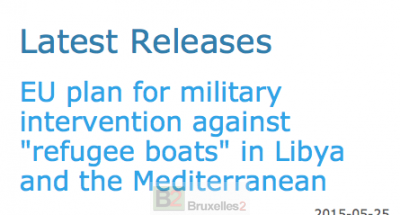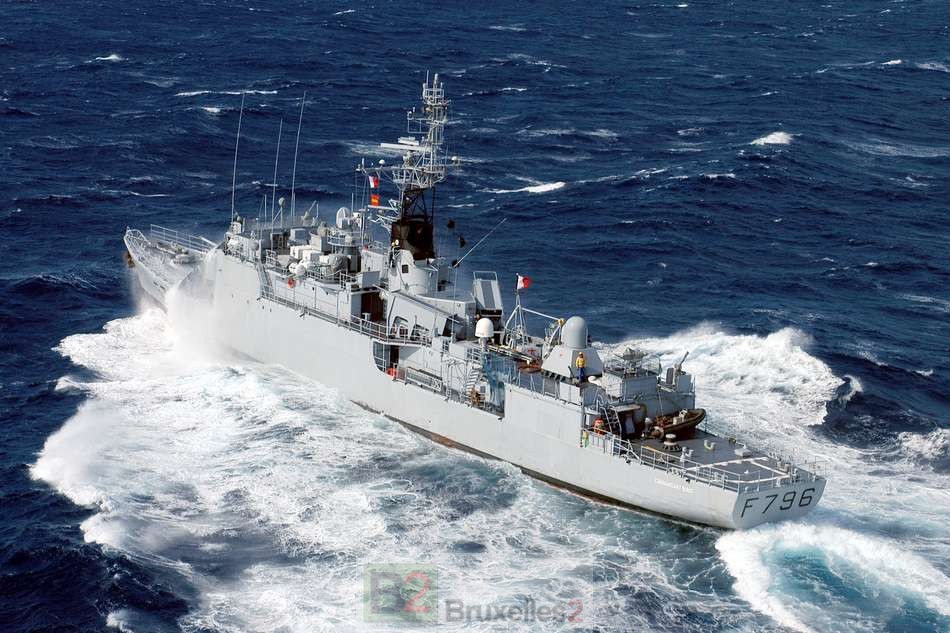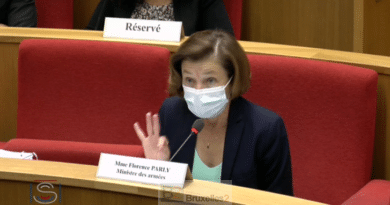EUNAVFOR Med operation plan revealed by Wikileaks. Truly ?
 (BRUSSELS2) Wikileaks has just revealed a "secret" document, which he presents as the "plan" for the future military operation in the Mediterranean (EUNAVFOR Med) "against refugee boats". A document that was then commented on by Steve Peers of the University of Essex, with more or less happiness. A hodgepodge of preconceived ideas, bordering on shameless lies...
(BRUSSELS2) Wikileaks has just revealed a "secret" document, which he presents as the "plan" for the future military operation in the Mediterranean (EUNAVFOR Med) "against refugee boats". A document that was then commented on by Steve Peers of the University of Essex, with more or less happiness. A hodgepodge of preconceived ideas, bordering on shameless lies...
Confuse an operation plan and an opinion on a concept
We have known the organization of Julian Assange a little more insightful, more judicious... The authors of the leak seem a little uneducated in terms of military planning, even unable to read this document, or else they wanted to make a "coup “where there was no real place to be.
Firstly, the operation mounted by the Europeans is not intended to "fight the refugee boats" but aims to counter the traffickers. To say otherwise is to confuse the sheep with the wolf. Or else it would be claiming that all refugees are traffickers! It's not very serious... (a trap in which are fell my two colleagues from Le Parisien).
Second, the two "leaked" documents are not the EU's "operational plan" at all, as presented. But the "opinions" of two "working" groups of the Member States — on the one hand the experts of the Political-Military Group (GPM), on the other hand the military representatives present in the Military Committee — on the draft management concept of crises which was submitted to the Ministers of Foreign Affairs and approved on 18 May. It will not be an insult to the authors of these documents to say that they are "just a link" in a rather long and complex decision-making mechanism, which goes from a more political first document, weaving together different options, and a mandate given by the European Council, to the Operation Plan itself, and to the decision to launch the operation, via a United Nations resolution which provides the international legal basis for the intervention. To see a plan in it is to be quite simply ignorant of the content of what a "Plan" is.
Thirdly, these documents are intended to give the future operation commander guidance in the future planning of the operation by emphasizing a few important points or still requiring clarification: intelligence (read: EUNAVFOR Med: Why is intelligence important? Why little problem of means?). Speech is quite free there, and fortunately, because it allows you to ask all the questions, including those that could be taboo, in an operation that has a real complexity.
The recommendations made are quite logical and sensible. It is a question of having a solid legal basis to be able to apprehend and prosecute traffickers, to clearly define what constitutes a migrant, a refugee and a trafficker. It identifies possible risks in certain areas (close to Libya)...and recommends having a strong protection force and robust rules of engagement. Which is quite logical too. Finally, he recommends having a thick communication, which is also called public diplomacy in another jargon. Which is more of a classic in any military operation. (Read also about the Club: EUNAVFOR Med, a complex operation, also legal)
The (wobbly) analysis of a law professor...
Seeing behind all this a secret EU plan to set foot in Libya, as University of Sussex professor Steve Peers, a specialist in European constitutional law, then explains, the prelude to a ground operation in Libya is therefore rather daring and is as far from analysis as a cow's udder is from a glass of champagne (and again 🙂
"A EU military planning document reiterates that the EU's new anti-smuggling operation could result in a ground conflict in Libya that leads to the loss of life of soldiers, refugees and smugglers, and destabilizes Libya in the process" writes Steve Peers in his text of 3 pages to download on State watch.
Er... Until further notice, Libya is not really a quiet land, a dream place for family vacations on which the European Union would come to sow trouble and storm... Professor Steve Peers seems to have mistaken the objective of this operation which, even if it uses military means, remains a "police at sea" operation and not a "military intervention in Libya".
What the European experts are saying, in fact, is that military activity must be precisely calibrated, particularly in Libyan internal waters, to avoid destabilizing an ongoing political process by causing collateral damage, not to postpone questioning legitimate economic activities (NB: we are thinking in particular of fishing activities) or creating the perception of having chosen a party. (NB Which is a real risk. Attacking certain traffickers, destroying their means (ships), can be taken by certain militias who protect these means, benefit from them, even organize the traffic in one way or another is indeed a risk). This comment makes a lot of sense...
"The IMD should also emphasize the need to calibrate military activity with great care, particularly within Libyan internal waters or ashore, in order to avoid destabilizing the political process by causing collateral damage, disrupting legitimate economic activity or creating a perception of having chosen sides
Not satisfied with his fact, Steve Peers continues his "analysis" (! if you can call it an analysis). he wonders about the fact that everything is not yet precise in this "plan", that "military and political orientations must still be given", "the rules of engagement do not yet exist"...
The document explicitly acknowledges that the operation has no clear end point: "the political End State is not clearly defined" This should disturb anyone who has studied previous military operations that have gone wrong or spun out of control due to lack of clarity on what the final objectives are. Indeed, the document makes clear that most of the details of the ongoing operation have yet to be worked out
There we are no longer in error of analysis, we are in crass ignorance. The European decision-making process is, in fact, quite rehearsed and even quite procedural. To go quickly, the Crisis Management Concept (CMC) - which was the subject of the two opinions (revealed by Wikileaks) is intended to fix the various issues of a crisis, the main means of responding to them, and the main questions that need to be resolved. It precedes a decision by ministers to establish a mission. Both were endorsed by ministers on May 18. Then will come military instructions, orientations, a concept of operation, an operation plan, rules of engagement... It is obvious that at this stage a certain number of questions still remain to be settled. The European authorities make no secret of it. General de Rousiers, Chairman of the EU Military Committee, said very officially on May 19 (after the meeting with the EU Military Chiefs of Staff) that " it is a complex operation in a complex environment »
Regretting that these rules have not been defined is like worrying about not seeing the application circular published when the first paragraph of the law has not yet been voted on. Proclaiming himself a "law professor" to come out with such a conclusion is worthy of the Lépine contest for the worst copy. I don't know where Steve Peers teaches, but in any European university, worthy of the name, such nonsense would earn its author a nice zero mark and a return to basics...
Comment: extracting one or two sentences to gloss without taking into account the context in which these sentences are posed and overinterpreting certain words to extract not what is but what one thinks, is not really worthy nor of an academic analysis , or a journalistic comment. One can frankly ask what is the goal sought by these authors, in search of sensationalism. Do they want human trafficking to continue, for shipwrecks to persist, for Europe to remain inactive in the face of these tragedies on the one hand, and this threat on the other?
(Nicolas Gros-Verheyde)
Read also:


